Taylor Swift, Apple Music, And The Future Of The Music Business
Taylor Swift is taking a stand against Apple's new streaming music service, and she's largely right.
One of the biggest stars in the music business is taking a stand against Apple’s new streaming music service:
First, Taylor Swift spoke out about the economics behind Spotify. Now, she has taken aim at Apple over its decision not to pay musicians during a trial period for its new music service.
In a letter posted on her Tumblr page on Sunday called “To Apple, Love Taylor,” Ms. Swift spoke of a situation that has sent shock waves through the music industry: Apple has finally announced a subscription streaming service to compete with Spotify, Rhapsody and Deezer, but says that it will pay no royalties during a three-month period when customers can try it free.
Ms. Swift called the policy “shocking, disappointing and completely unlike this historically progressive company,” and added that she was not just speaking for herself.
“These are the echoed sentiments of every artist, writer and producer in my social circles who are afraid to speak up publicly because we admire and respect Apple so much,” she wrote. “We simply do not respect this particular call.”
The new service, Apple Music, is set to open around the world on June 30. In addition to its longstanding iTunes download store, it will include a $10 streaming subscription plan, a free Internet radio station and a media platform that will let artists upload songs, videos and other content for fans. Unlike Spotify, which lets customers listen free or pay monthly fees to eliminate ads, Apple’s subscription feature will have no permanent free level.
The public letter from Ms. Swift — who will not be offering her new album, “1989,” through Apple’s new service because of its stance — comes after independent music groups around the world have complained that the company’s terms were unfair.
“This is a major misstep as Apple is trying to launch this service,” said Jeff Rabhan, the chairman of the Clive Davis Institute of Recorded Music at New York University. “Apple has always positioned itself as a supporter of artists, and this was a very easy way for them to prove that and stand out from everybody else in the space.”
Apple declined to comment.
Apple has said that at least 71.5 percent of the money it collects from music sales will be paid in royalties, a slightly higher ratio than the industry standard of 70 percent. But record executives, particularly at small labels where margins are thin, describe a frightening scenario in which income from important new albums that come out during the free period would not only lose out on important download income but also get nothing from Apple’s new streaming feature.
The complaints also come as various government agencies in the United States and in Europe, including the attorneys general of New York and Connecticut, have begun investigating possible anticompetitive practices in Apple’s dealings with record companies over streaming music contracts.
Ms. Swift, one of the best-selling artists in music today, has been outspoken about economic issues for musicians. In an opinion article in The Wall Street Journal last year, she wrote: “Valuable things should be paid for. It’s my opinion that music should not be free.” A few months later she withdrew her entire catalog from Spotify because that company would not restrict access to her music to its paid version.
As streaming becomes a larger and larger part of the way that people, especially the people who fall into the target demographics that the music industry cares about, consume and are exposed to music, the issue of how artists, songwriters, musicians, producers and others involved in creating music is becoming a larger and larger issue. Along with many other big artists, Swift has complained about Spotify in particular in the past due to the fact that the royalties that songs earn are almost infinitesimal even when they are among those tracks that are played most frequently. That is what led her and some other top artists to pull their music from Spotify completely, and it’s a good part of what’s behind the objections to Apple’s new service. In this case, though, the objection is to something that seems to be more egregious, the fact that Apple has apparently decided that it will not pay any royalties at all during the three month free (to customers, and apparently to Apple) trial period. Given that Apple’s plan includes a service that is subscription based but has no free alternative, I suppose this makes sense for them from a business point of view in that it’s a way to get consumers hooked on the service to the point where subscribing on either a monthly or annual basis seems like a no-brainer to them. There’s nothing objectionable about that business decision per se, but approaching that trial period with the understanding that Apple will not be paying royalties seems to me like a patently unfair move on Apple’s part.
Obviously, Apple can’t just implement the “no royalties” policy on it’s own. Apparently, it’s part of the contracts that are being entered into with record companies, artists, and the other people who hold rights over music distribution. To a large degree, Apple is in the superior bargaining position here because they have a virtually guaranteed market of consumers that these artists will want to have access to, and most of these artists are nowhere near being in the same position as someone like Taylor Swift who, as she says in her post, makes more than enough money touring to not have to worry about getting royalty checks. Whether a decision by Swift and others in her position to boycott Apple Music will lead to a change of heart in Cupertino is unknown, but it seems to me that they’re on the right side of this argument. People ought to get paid for the music they create, that’s why Napster was quite obviously wrong in the way it essentially created a means for people to get permanent copies of music they never paid for. Streaming is different in that users aren’t able to save the music they’re listening to, but the principle is the same. When you hear a song on the radio, or in a television show or movie, someone is getting compensated for that, there’s really no reason why that shouldn’t happen when its a streaming service doing the “broadcasting.”
This is likely just the beginning of a battle between the music industry and technology companies like Apple over these issues. As I noted, streaming is quickly becoming the most prominent means by which people consume music, companies such as Spotify and Apple make money off it via subscriptions for premium services or through ad sales. Consumers subscribe to these services because they get easy access on the go to their favorite artists. At some point, the two sides are going to have to come to some agreement on how the money these services generate will be divided up. Until then, you’re likely to see more artists taking the position that Taylor Swift is taking, and I can’t really blame them.
Update: Apple announced late Sunday night that it was reversing course on the royalty policy.
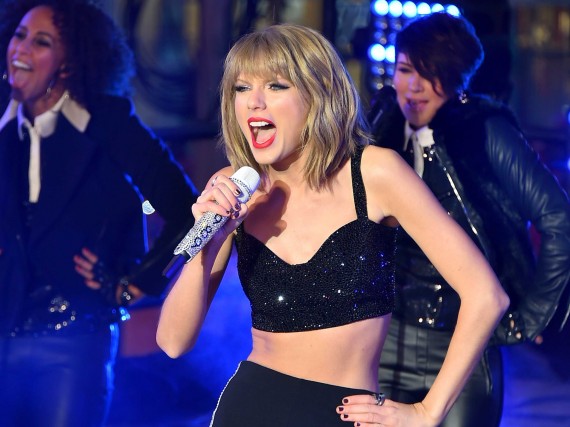

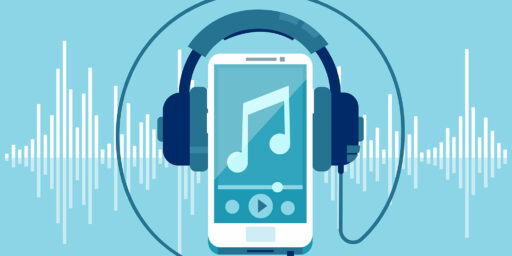
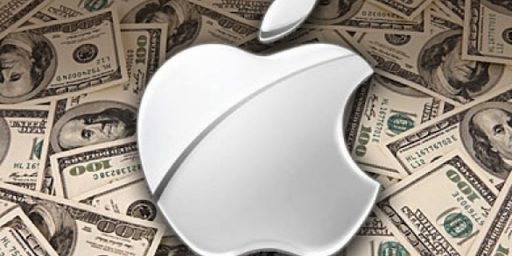

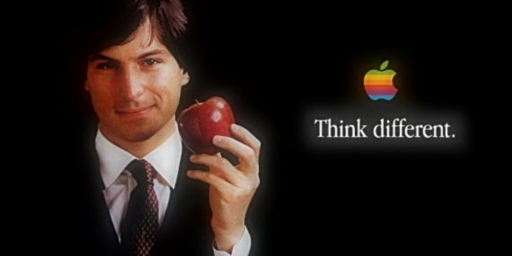
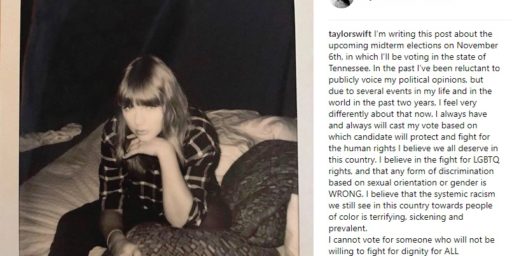
Yeah, I’m with her on this.
It’s fine that Swift makes money on tour, lots of musicians do. But not every musician is a touring kind of act. We need a way for musicians who are not stage acts to sell their music without being systematically ripped off, in this instance by a company sitting on (last I heard) 170 billion dollars in cash.
The “recorded music” business is not generating much money anymore, so this should be a rather short conversation.
In the land of streaming music, if Taylor Swift isn’t selling her recordings to the streamers, she’s not selling her recordings period.
Meanwhile, artists not named Taylor Swift are using the streaming services to reach new audiences, who will buy tickets to see them perform live.
@James Pearce: “In the land of streaming music, if Taylor Swift isn’t selling her recordings to the streamers, she’s not selling her recordings period.”
Um, no. Taylor Swift is one of the biggest selling acts in pop music, and her last album, which she refused to put on streaming sites, outsold her previous two, selling 4.5 million units in the first five months, which made it the top sellling album of 2014 and the first third of 2015.
@James Pearce: @wr:
Louis CK has really shown the way to comics, selling his special through his own site before letting them out into the Netflix etc… environment. The same approach is available to musicians. If they can attract ears, they can sell direct and keep all the money.
If two dozen big name acts (Swift, Kanye, U2, One Direction) started refusing they could make streaming “uncool.” It would be easy to create an app that led to non-streaming, non-corporate content. Musicians need to kill streaming so they can negotiate a new deal from the ground up.
@wr:
Which means that if she were a commercial for diet pills would have a disclaimer reading, “Results not typical.”
Album sales are on a one-way trajectory towards not being a viable business at all. Think of the typical 15 year old today. How many records is she buying now? How many records will she buy once she gets her first real job? Does she even think of recorded music as something you can buy? (I do. But then again, I used to buy it at a store.)
In the world of streaming music*, there will be no records to buy. Picture Jim Mora saying: “Album sales? Album sales?”
(* A world in which we don’t yet live, it should be said.)
Wow, Doug is arguing that musicians should form a union. Glad to have you aboard the pro-union train Doug.
Let’s face it since the onset of digital music, musicians have been screwed six ways from Sunday. Streaming looks like yet another way. The streaming music payouts to musicians are truly pathetic, and we are going to have to find a different way to divide the pie if we hope to have a viable music industry.
This isn’t a problem for us old fogies, who have our Beatles and Stones and Marley and Sinatra in our collections. We can just continue playing the good old stuff. But if new musicians can’t make a living at music, after a while there won’t be new musicians.
@michael reynolds:
I see a lot of this happening now. The three shows I’ve seen at Red Rocks this year are Clutch (doing it themselves since the late 90s, when their record label dropped them), Brit Floyd, a touring “tribute” act that plays all covers, and Rebelution, a reggae band that runs their own record label. They’re not selling many records, but they’re selling out shows.
At Red Rocks.
That said, I’m not sure Apple is the villain here. Streaming is the current hotness. Apple pioneered the previous model of digital music downloads with its iTunes store, and they would been happy to continue with that model. Apple came to streaming late, and it understood it would have to do something special to break in. ( Some doubt that even this three month free trial period will be sufficiently special).
Artists are free not to participate during the three month trial period, and can still sell their albums in the iTunes Music Store. It would be nice, though, if Apple had found some way to pay the artists during the trial period. I hope that this can still happen.
@stonetools:
There was music long before we had records, and there will be music long after. We may have entered a phase where it is harder to make a living at it, but there will still be plenty of new music.
@stonetools:
Same old song, as it were. When all performances were live, the owners of the venues colluded to screw the performers. When recording became viable, the owners of the record labels colluded to screw the performers. Why would anyone expect the owners of the digital distribution channels to be any different?
Yeah, this is an 4$$h013 move by Apple. Telling artists that they all should not be paid for three months so that Apple can gain a foothold… I can understand why Apple would want people to pay for its service instead of for instance Spotify, but I can’t see why the artists would care, Spotify keeps about 30%, Apple is said to keep 28.5%, that would be 5% less. So, Apple really can’t pay a lot more per customers than Spotify, though Apple may get more people to pay.
(If an artist would get a constant $x from Spotify each month and $1.05x from Apple after the initial three three months without pay, then it would take five years until the extra 5% have paid for not being paid at all for three months. Payouts aren’t obviously constant…)
@Gustopher:
Not necessarily. The problem is we can’t see what ain’t there, so there could be lots of musicians who look at the business and think, “I can’t support my kids, I’d better sell life insurance.”
Artists of all types (including writers) like to talk a lot of smack about art for art’s sake, but art is made for money. Michelangelo, Shakespeare, BB King, it doesn’t matter, if artists can’t survive then they can’t make art. Art requires time and space, and both those things cost money.
Musicians are being asked to work for free, something we don’t ask of people generally.
I recently had a conversation with senior executive for a company that has one of the biggest recording acts on the planet. This artist is international, but he’s been dead for 20 years. There is no way for him to tour.
She told me that they make $0.00003 per stream on Pandora and Spotify. that’s 3/10,000 of a penny per stream.
Linda Perry recently stated that she received a $300 check for 30,000,000 (Thirty MILLION) streams of “You’re Beautiful” http://www.huffingtonpost.com/2015/06/19/linda-perry-pandora_n_7621938.html
I don’t listen to Pandora or Spotify, and I won’t listen to Apple’s new service.
Regardless of how much money Apple is sitting on, there’s absolutely no reason it shouldn’t go ahead and pay the royalties for those 3 free months. If I, a movie equipment company, decide to go ahead and show movies to people visiting my stores in order to demonstrate the excellence of the equipment, that doesn’t get me out of having to get permission to show the movies and to pay royalties for the copyright.
The only reason Apple is being able to twist artists arms to sign a contract which basically says no royalties for the first three months is because of monopoly power. Damn right the FTC should get involved.
@Gustopher: There was music long before we had records, and there will be music long after
Want to compare the quality and amount of music, particularly what could be called “pop” music, before and after records?
This is the same thing we get into with the whole “cut the cord” argument on television. The “cut the cord” people also tend to be the same folks who rave about today being a new Golden Age of TV, yet they never seem to think about the economic engine that has made this new Golden Age possible.
Mike
@michael reynolds:
I get your point, but not sure I agree with it. The market for recorded music has collapsed. It’s not dead, but it’s been fundamentally altered. It’s harder and harder (not yet impossible) to sell “copies” of recordings. Digital on-demand rendered that model obsolete.
@EddieInCA:
I heard this story too, but it made me wonder: How many times would “You’re Beautiful” have been streamed if everyone had to pay what Linda Perry thinks the song is worth? I doubt it would have been thirty million times….
As for your dead recording artist….How come “Stop paying dead people for stuff they did 20 years ago” never comes up when we’re talking about how to better compensate new artists?
At any rate, either of you guys (Michael, Eddie, or anyone else really) hear of Steve Albini’s rant on the subject?
@MBunge: In the early years of the 20th century, people would go up into the backwoods of Appalachia (well mostly near rail lines, actually) and do field recordings of the people there, playing their folk and country on their front porches.
No significant money changed hands, and we know that there was great music being created, of countless different styles. One expects that a little further from the rail lines, there was entirely different styles now lost forever because no one bothered to record it.
The production quality wasn’t as good as current pop, but the equipment needed for that is now dirt cheap. And, people can go around the music labels and other cultural gatekeepers releasing things directly. There’s a huge discovery problem, but we might be on the edge of a great period of amateur music.
@Gustopher: There’s a huge discovery problem, but we might be on the edge of a great period of amateur music
And what right do you have to listen to any of it without compensating the performers?
You performing for your neighbors and your neighbors performing for you because there is literally no other entertainment available is not really applicable to this situation.
And I suspect that an awful lot of that Appalachian music sucked. Or do you somehow believe that music is different than every other thing humans do in that amateurs who have less time and energy to devote to it are superior to professionals? Can an amateur do your job better than you?
Mike
@James Pearce:
What if you’re a composer or a lyricist, not a performer? As Michael said above, not every musician is a live act. Not every musician is a performer. Not everyone who can write a song can sing it. How do you compensate those people whose skill is in composing and writing music, not in playing or singing before a live audience?
@Rafer Janders: The same way we have in the past–poorly.
@Rafer Janders:
Fair question.
I guess for me, the lynchpin comes down to economics. A thing is worth what someone will pay for it. When it comes to music, that’s a very subjective thing indeed. Recorded music doesn’t have much earning potential anymore, so the concept of royalties will have to adjust accordingly.
I suppose skilled composers can make their living doing what many of them do now, composing music for people who perform it. They can negotiate the fee with the performers. Royalties probably won’t be part of the discussion.
In the Steve Albini rant I mentioned earlier, he says:
It is. It really is.
@James Pearce: The “how come I’m paying for a dead artist” is a length of copyright issue, and has nothing to do with the royalty rates from streaming.
I’m one of those who thinks that we should EITHER go back to the twice-28-years setup which we historically had, OR we should go to a trademark-renewal type of mechanism once-every-ten-years-perpetually WITH the extra twist that the renewal fees increase exponentially over time. If Disney wants to maintain its Mickey Mouse monopoly they can damn well pay for it.
Apple reverses itself – http://gizmodo.com/apple-does-abrupt-about-face-over-unpaid-streaming-1712983639
At this point Apple should be broken up – it’s clearly got monopoly power in the music industry.
@grumpy realist:
I agree completely. But the “paying dead artists” stuff has a lot to do with streaming royalties. On the pie chart of “who gets streaming royalties,” dead people definitely have a slice. I’d even bet it was larger than the “new artist” slice.
Indeed, I think it’s safe to say it’s easier for dead people to make money in the recorded music business than it is for live people.
I trying to figure out where ASCAP and BMI is on this. I mean they are the ones who license the performance rights. Radio, jukeboxes and everything else has been generating income though licencing. Why are they giving the streaming services a break? Is there something about streaming that makes them immune to paying the fees that are in line with broadcast outlets? Or is it that streaming just isn’t bringing in the revenue which tells me that it’s the platform that isn’t ready, not some kind of disruptive technology deal.
@James Pearce:
Only if there’s a free market for that good. There has never been anything like a free market for recorded (or live) music.
The internet (and the availability of relatively cheap recording equipment) offers a new possibility of direct distribution by artists that the public would discover through “audio search engines”. For obvious reasons, the established distributors are fighting hard to make sure that never happens.
@DrDaveT: For me that existed for a while and it was called Napster.
That program was responsible for about 20 CD purchases that I normally wouldn’t of made.
@Matt:
That’s not a “free market”; that’s “theft”.
@DrDaveT: Yes it’s totally theft that I listened to music before buying it.